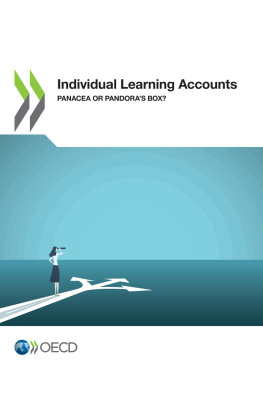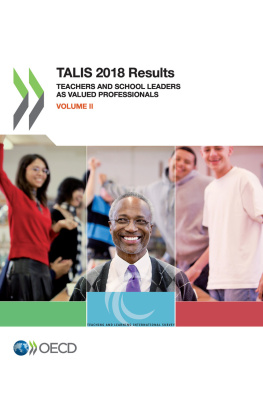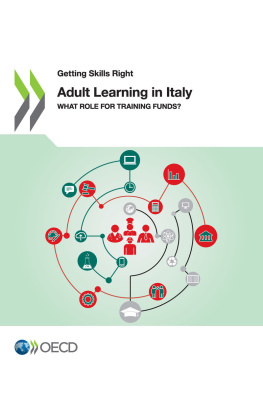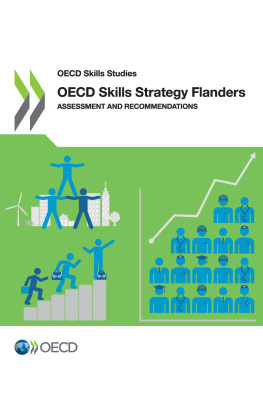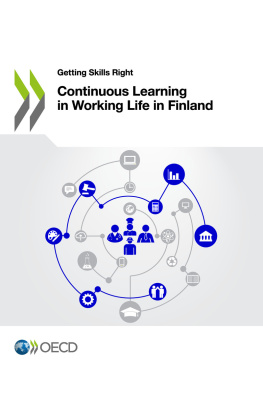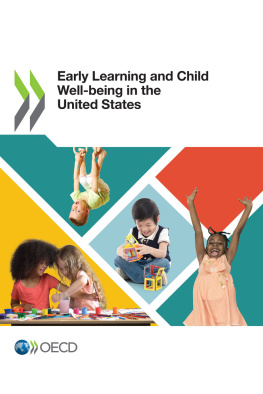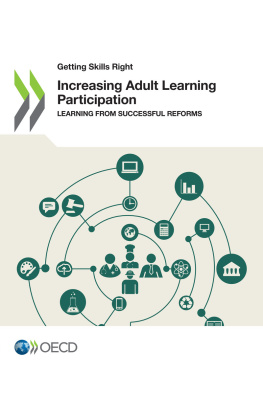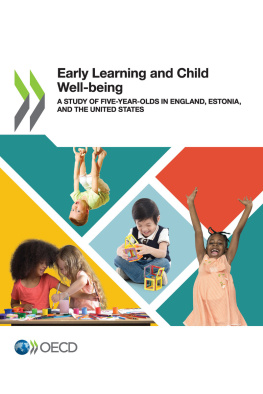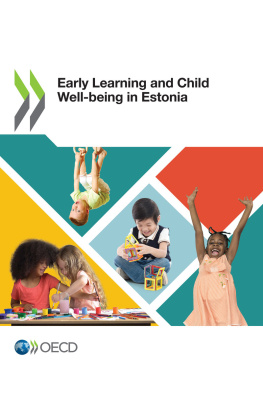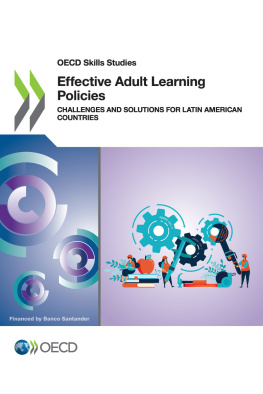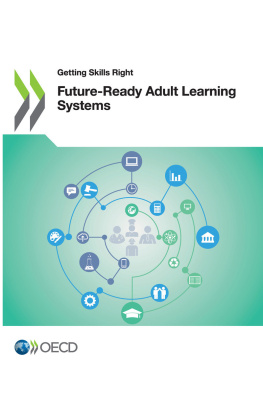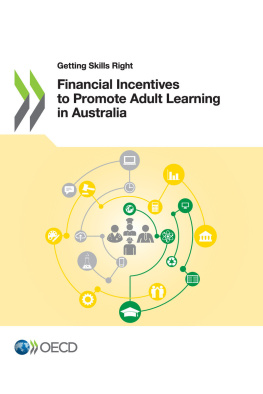OECD - Individual Learning Accounts
Here you can read online OECD - Individual Learning Accounts full text of the book (entire story) in english for free. Download pdf and epub, get meaning, cover and reviews about this ebook. year: 2019, publisher: OECD Publishing, genre: Politics. Description of the work, (preface) as well as reviews are available. Best literature library LitArk.com created for fans of good reading and offers a wide selection of genres:
Romance novel
Science fiction
Adventure
Detective
Science
History
Home and family
Prose
Art
Politics
Computer
Non-fiction
Religion
Business
Children
Humor
Choose a favorite category and find really read worthwhile books. Enjoy immersion in the world of imagination, feel the emotions of the characters or learn something new for yourself, make an fascinating discovery.
Individual Learning Accounts: summary, description and annotation
We offer to read an annotation, description, summary or preface (depends on what the author of the book "Individual Learning Accounts" wrote himself). If you haven't found the necessary information about the book — write in the comments, we will try to find it.
OECD: author's other books
Who wrote Individual Learning Accounts? Find out the surname, the name of the author of the book and a list of all author's works by series.
Individual Learning Accounts — read online for free the complete book (whole text) full work
Below is the text of the book, divided by pages. System saving the place of the last page read, allows you to conveniently read the book "Individual Learning Accounts" online for free, without having to search again every time where you left off. Put a bookmark, and you can go to the page where you finished reading at any time.
Font size:
Interval:
Bookmark:
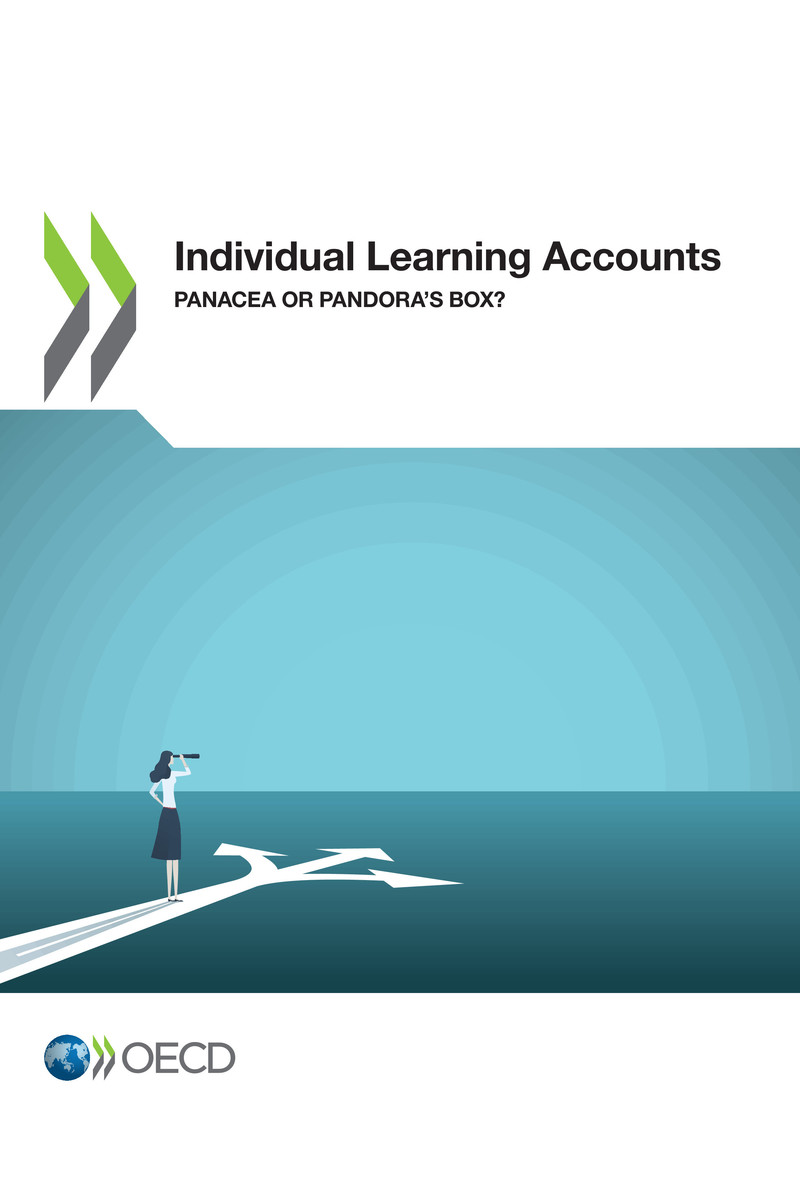
OECD (2019), Individual Learning Accounts : Panacea or Pandora's Box? , OECD Publishing, Paris, https://doi.org/10.1787/203b21a8-en .
Many countries have seen recent growth in technology-facilitated forms of work, such as crowd work and on-demand work via apps and platforms; but there has also been growth in other new forms of work, like casual work (on-call, voucher-based and zero-hour contracts, as well as mini/flexi-jobs). Moreover, growth in subcontracting and outsourcing has prompted an increase in own-account work.
For some workers, these new forms of work provide income top-ups, while others appreciate the flexibility that they offer in how and where to work, resulting in a better work-life balances. However, for many other workers, these new forms of work imply lower job quality, whether it be lower job security, less social protection, wage penalties or a lack of voice). Recent evidence has suggested that job mobility in the labour market has increased and that tenure, once population ageing is controlled for, is declining . These trends, which tend to affect youth and the low-skilled in particular, are worrying from the perspective of job quality and the sustainability of social protection systems.
Increased mobility in the labour market driven by a rise in non-standard work also raises concerns about training. Already, OECD research has indicated an important deficit in training as economies undergo important structural transformations with a decline in manufacturing jobs and a rise in service jobs . These challenges become even greater in countries that are experiencing a rise in the number of non-standard workers who, on average, have a lower probability of participating in training. In some cases, such workers may have no employer responsible for financing their training since they are working as independent contractors. In other cases, workers either have several employers or frequently change employer, so that the latter have little incentive to invest in the skills of workers with whom they will have only very short working relationships. Many workers in these new forms of work may also struggle to gain access to good information, advice and guidance. Finally, working conditions could make training more difficult, for example when working time and place are not well defined. These are challenges that are also shared by workers in more traditional non-standard contracts, including temporary and self-employed workers.
In this context, the idea of giving individuals an individual account for learning/training has received a lot of interest in policy circles. Such an account would allow individuals to accumulate training rights, carry them over between jobs and employment status, and promote individual investments in lifelong learning. While there is much talk about such accounts and many countries are considering setting one up, relatively little is known about them. The purpose of this report is to develop guidance for policy makers in designing such accounts, and to provide a check list of things to consider to make such schemes successful. The approach used is to look at experiences with existing/past schemes through a detailed case study approach and literature review.
One of the challenges encountered is that, to date, only one real individual learning account exists: the Compte Personnel de Formation in France . The report therefore takes a broader approach by looking at individual learning schemes (ILS), which include: i) actual individual accounts where rights/savings for training financed by the individual and supported by the state and, in some cases, the employer are accumulated over time; as well as ii) training voucher schemes which support training through direct governmental payments, sometimes with a contribution from the participant. ILS are not new and they were initially introduced in the early 1990s with the objective of creating a market for skills whereby individuals are empowered to choose their own training among a set of courses offered by providers competing against each another. The current, interest in ILAs is slightly different and focuses mostly on their potential to attach training rights to individuals rather than jobs, and therefore their ability to make training rights more portable between jobs and from one employment status to another. This is a main objective of the Compte Personnel de Formation implemented in France since 2015, as well as of the recently created Canada Training Credit.
Six new case studies were commissioned by the OECD for the purpose of this report. The case studies, based on common terms of reference, used available data and possible existing evaluations as well as qualitative material collected in interviews of various actors involved in the schemes.
The report takes stock of these experiences and of others described in the literature, with the ultimate aim of identifying the advantages and disadvantages of such schemes, as well as the key trade-offs and questions to consider in designing a successful scheme. The lessons learnt are relevant to the design of individual learning accounts, but also to individual learnings schemes (as defined above) more broadly. Section 1 starts by defining individual learning schemes and discussing their objectives. Section 2 reviews the design of these schemes. Section 3 provides evidence on outcomes, in particular on participation and the type of training undertaken. Section 4 discusses the extent to which ILS manage to increase participation among groups usually under-represented in training. Section 5 examines training quality issues associated with ILS. Finally, Section 6 provides some conclusions and discusses trade-offs emerging from the analysis.
This report received financial support from the German Federal Ministry of Labour and Social Affairs. It was written by Ann Vourch under the supervision of Stijn Broecke. Statistical work was carried out by Dana Blumin, technical assistance was provided by Katerina Kodlova and editorial assistance by Lucy Hulett. The report benefited from comments from Glenda Quintini, Anja Meierkord and Marieke Vandeweyer from the OECD Directorate for Employment, Labour and Social Affairs, Dana-Carmen Bachmann from the Directorate-General for Employment, Social Affairs and Inclusion of the European Commission, Coralie Perez from the Centre dEconomie de la Sorbonne , Denis Donoghue from Hall Aitken, and Randall W. Eberts from W.E. Upjohn Institute for Employment and Research.
Font size:
Interval:
Bookmark:
Similar books «Individual Learning Accounts»
Look at similar books to Individual Learning Accounts. We have selected literature similar in name and meaning in the hope of providing readers with more options to find new, interesting, not yet read works.
Discussion, reviews of the book Individual Learning Accounts and just readers' own opinions. Leave your comments, write what you think about the work, its meaning or the main characters. Specify what exactly you liked and what you didn't like, and why you think so.

